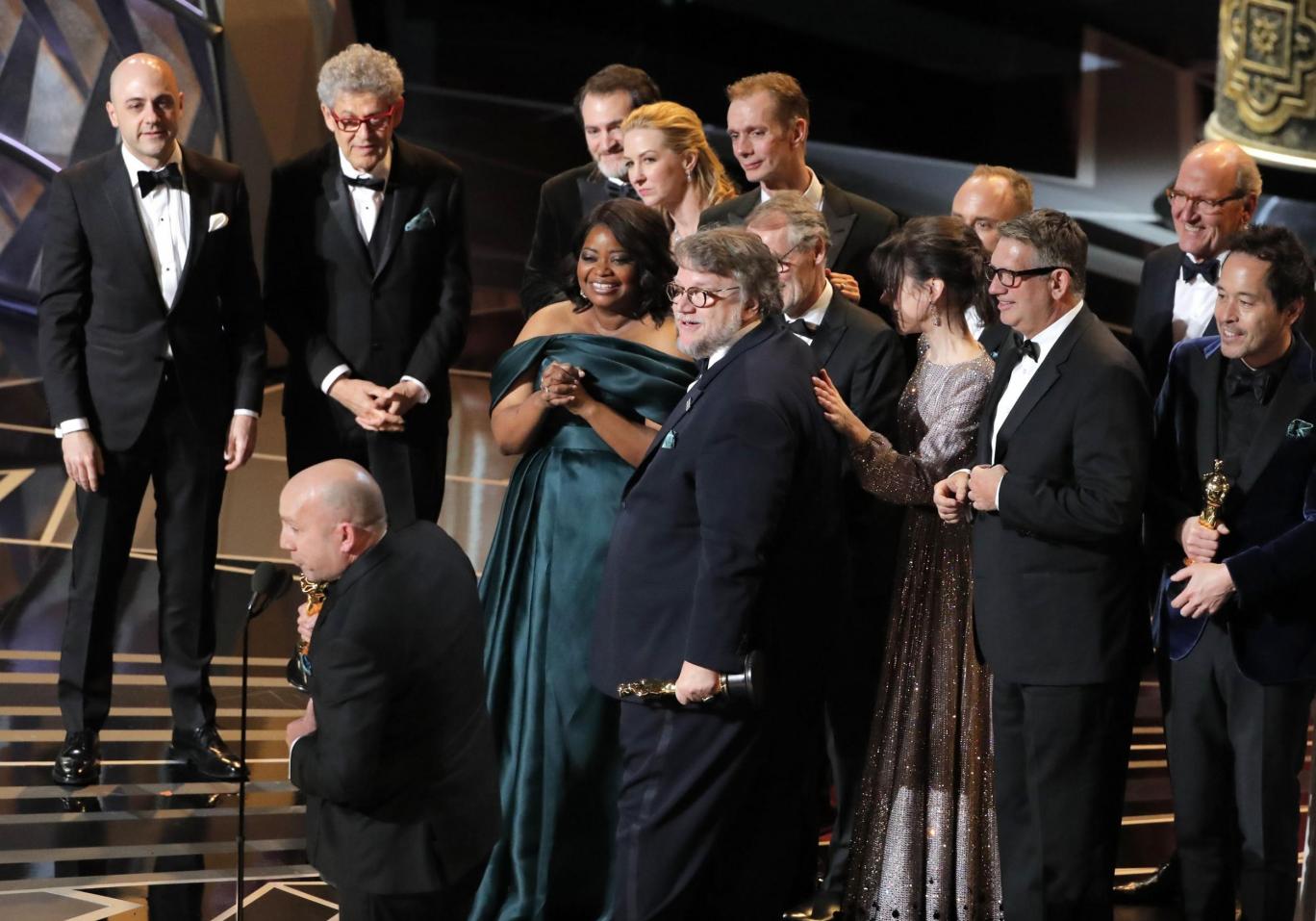With arguably the most diverse list of nominees in years—Get Out, Call Me By Your Name, A Fantastic Woman and Lady Bird all had nominations in various categories—all eyes were on the 90th Academy Awards to see just how the Academy would respond to the recent social justice movements of #MeToo, #OscarsSoWhite and #TimesUp. These concerns were very much addressed during the ceremony. Presenters, very aware of the social context surrounding the event, made significant efforts to emphasise the importance of diversity and inclusion. Emma Stone, when presenting the award for Best Director, announced the nominees as “these four men and Greta Gerwig.”
The winners too, though not radically diverse, were an improvement from previous years. The Shape of Water, a film about the unifying power of love and the importance of finding humanity where it may often be overlooked, won Best Picture, beating out favourites Three Billboards Outside Ebbing, Missouri and The Darkest Hour. The film also netted Mexican director Guillermo del Toro the award for Best Director, his first Oscar win, and his fourth nomination overall.
Notably, Jordan Peele bagged an Oscar in the Best Original Screenplay for Get Out, the first black director to win the award. He and Greta Gerwig were also the fifth female and black directors respectively to ever be nominated for Best Director, but ultimately lost out.

Rachel Morrison, the first-ever female nominee for cinematography, lost out against Roger Deakins. The prolific cinematographer won his first Oscar for his work on Blade Runner 2049, which was universally praised for its breathtaking visuals. Deakins’ win was his first after 14 attempts.
Though the diversity on show was a nice sentiment, it did seem to border on self-congratulatory at times, with the guests on show making ‘safe’ political comments rather than anything genuinely challenging. Where Stormzy brought a brief but brutally specific and honest political statement to the BRITS, the Oscars saw Common and Andra Day perform a vague, toothless song about celebrating our differences and rising above. Where the BAFTAs and the Golden Globes took a more subdued approach to the recent reverberations in the film world, the Oscars addressed these issues while decked out in Swarovski crystals—quite literally, as a giant arch glittered, towering above the stage. It was a tonal dissonance that crept into almost all aspects of the show, from its lip-service to the Black Lives Matter movement, to host Jimmy Kimmel’s endorsement of the Parkland students’ planned march for gun control.
Instead of humility and admission of its past wrongs, Hollywood seemed to be congratulating itself for just how far it’s come. It’s hard to see this as appropriate, considering we still have yet to see a black director win the Best Director award, nor another female winner since Katheryn Bigelow became the only woman to win the award with her film The Hurt Locker. Just last week, the Academy made headlines when older members declared that Get Out was “not an Oscar film,” despite not having seen it.

That’s not to say that there wasn’t anything to praise on the night. A short video which highlighted the diversity and representation in today’s films, featuring prominent women, POC and minorities in the industry, was touching, and managed to be a genuine moment despite the event’s extravagant leanings. Ashley Judd, Selma Hayek and Annabella Sciorra, three of the first Harvey Weinstein accusers and important figures in the #MeToo movement, also shared the stage, a moving reminder of the crimes Hollywood turned a blind eye to for too long.
Frances McDormand’s acceptance speech for the Best Actress award, which she won for her outstanding performance in Three Billboards Outside Ebbing, Missouri, was the event’s final standout moment. In a symbolically resonant moment, McDormand put down and towered over her trophy—a traditionally male figure—and called upon women in the audience who were part of the film industry to stand with her. “If I may be so honored to have all the female nominees in every category stand with me tonight,” she said, calling upon Meryl Streep first, “because if you do it, everyone will.” Paying tribute to “the filmmakers, the producers, the directors, the cinematographers, the designers…”, she continued, telling the audience to “look around ladies and gentlemen, because we all have stories to tell.” It was a powerful symbolic gesture, and one made more powerful by her final words: “inclusion rider.” Backstage, she explained exactly what this was: “[It] means that you can ask for and/or demand at least 50% diversity, not only in casting but also [in] the crew.” It was a real suggestion for how individuals could improve the industry, which was refreshing in a ceremony which disappointed with its lack of humility.
Other significant moments:
-
- James Ivory, at 89 years-old, won the Oscar for Best Adapted Screenplay for Call Me By Your Name, becoming the oldest person to ever win an Oscar.
- Warren Beatty and Faye Dunawaye, who wrongly presented La La Land with the Best Picture award last year, returned this year to present the same award without issue. Twitter was quick to notice the huge lettering on this year’s envelopes, a change introduced after last year’s high-profile fiasco.
- Sufjan Stevens, joined by St. Vincent and Moses Sumney, gave a haunting performance of his song ‘Mystery of Love’ from Call Me By Your Name, which was nominated for Best Original Song.
- Biggest letdown: Greta Gerwig’s directorial debut Lady Bird was arguably the night’s biggest snub, bringing home no awards despite multiple nominations.
- Kobe Bryant is now an Oscar award-winning writer, his animated love letter to basketball, Dear Basketball, bagging the award for Best Animated Short Film
- A Fantastic Woman, directed by Sebastian Lelio, and which stars Daniela Vega as a transgender singer who has to deal with scorn and discrimination after the sudden death of her older boyfriend, won the award for Best Foreign Language Film. Another win for diversity.
Mikhail Hanafi
(Image courtesy of Evening Standard)

